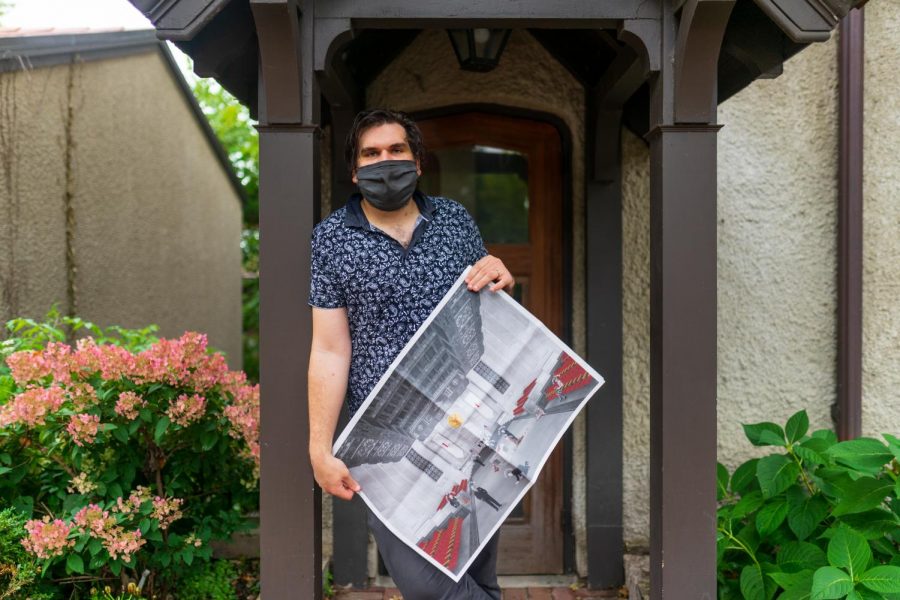In precarious times, Jewish Arts Council continues arts project-funding
Amid the global health crisis, Rimon, the Minnesota Jewish Arts Council, continues work funding the arts wherever they can.
Image by Parker Johnson
Artist Brooks Turner poses for a portrait with a piece of his art outside his home on Saturday, Sep. 12. Turner will exhibit his art in a display centered around past examples of anti-semitism in Minnesota at the Weismann Art Museum in late October. “While starting this project I never thought how much I would uncover, how much I would learn, and the paths that I found while researching.”
Minnesota-based Jewish Arts Council Rimon is entering their 25th year of operation, however COVID-19 isn’t making things easy. Founded in 1995, Rimon centers much of their work around project support grants for local artists and arts groups. These grants are given out to a handful of applicants semi-annually and aim to provide funding across art projects of all mediums that are culturally relevant to the Minnesota Jewish community.
In light of the recent pandemic, however, Rimon has been forced to reevaluate the possibilities for current and future grant recipients. One of the most difficult problems facing Rimon’s council members was the question of how to proceed with funding for projects in the performing arts.
“In some cases, we have said to [prospective grant recipients], check back in with us in six months, where a project needs to be in-person,” Rimon’s executive director David Harris said. “We’re giving them the maximum leeway. Some projects really cannot pivot. They’re valuable, but they’re not meant to happen on a Zoom platform.”
While some grant recipients from this past spring have postponed their projects indefinitely, others are moving forward with original proposals, albeit with significant alterations.
Local artist Brooks Turner received funding from Rimon for his art installation titled “Legends and Myths of Ancient Minnesota,” scheduled to go up at the Weisman Art Museum in late October. His exhibition explores Minnesota’s history of involvement with “the Silver Legion,” a fascist organization that gained a large following in Minnesota during the 1930s.
Turner originally intended to use Rimon’s grant to build display cabinets for documents loaned from the Minnesota Historical Society but was forced to change plans following mass shutdowns in response to COVID-19.
He chose to pivot his project and use the funding instead to create a paper art piece composed of different historical documents and digital drawings relating to the Silver Legion. This paper will then be duplicated tens of thousands of times, and the composition will be exhibited at the Weisman as scheduled.
Novelist Amanda Minoff, who recently completed her Master of Fine Arts at the University of Minnesota, received funding for her manuscript “The Child Who Does Not Know How to Ask.” Unlike Turner, Minoff says she’s been able to continue work on her writing with minimal setbacks.
“I’ve mostly been working independently just on writing revising my novel,” Minoff said.
“Most of my budget was allocated to support me as I continue working on this project so I can reduce my hours spent in my other jobs, which I know might be different from some of the other projects that they received grants for that have more upfront costs.”
The University’s Jewish student center Minnesota Hillel was also able to complete its Rimon-funded project with fewer difficulties. MN Hillel received funding for the commission of local Jewish artists to construct new wood and glass artwork installations for their chapel room.
“We’re lucky that we contracted with both artists before COVID so they had already started thinking about working on the projects,” said Benjie Kaplan, executive director of Minnesota Hillel, said. “The nice thing is, each of the artists has their studios. And they were able to do their work in their own healthy, safe space.”
Rimon is currently in the middle of their fall application season, the deadline for which is Oct. 2. Rimon plans to continue with their project funding for the fall, with some uncertainty as to what will be in store.
“I’ll be very curious to see what kind of applicants we get this round,” Harris said. “What are they envisioning? Already I’m getting calls and inquiries and they’re coming from a variety of art forms. So, I think that many artists are trying to think with a positive frame of mind.”
Correction: A previous version of this article misstated the frequency with which Rimon distributes grants. The headline has also been updated to add clarity.











